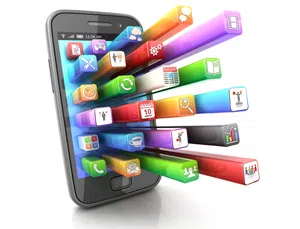Five unrealistic expectations we have for our smartphones
Advertisements promise that the latest smartphones, tablets, laptops and other gadgets will put blazing speed at our fingertips, enable us to multitask like an octopus and ensure we never miss a thing. Because new technology promises — and does — a lot for us, it's no surprise we've fallen in love with it.
But in our enthusiasm for our new digital communication tools, we've lost sight of the people behind the tools. It's time to turn that around. Until we restore a more people-centered approach, we'll continue to feel unsatisfied and largely unfulfilled by our interactions — despite having the most powerful connection and transmission devices in human history in the palms of our hands.
Here are five unrealistic expectations that have emerged during the long honeymoon of the digital communication revolution and what we need to do to correct them.
Communication is Easier
Just because our new devices enable us to reach out and touch someone with a few simple clicks, that doesn't mean that communication itself has gotten any easier.
We're caught up in the excitement of the digital revolution. But because our interactions involve quirky, emotional and sometimes unpredictable people, we can't eliminate imperfections from communication.
Communication is fundamentally imperfect, and no matter how fancy our devices may become, they'll never be able to eliminate the misunderstandings, the confusion and the errors that occur when people talk.
Some communication is just plain difficult. Such as, when we have to communicate bad news, tackle a sensitive topic or have a conversation to address a difficult problem. Yes, it's easier to send and receive messages today, but it's important to remember that communication is as hard, and may be even harder, than it ever was.
Send Equals Success
Our devices have greatly simplified the sending and receiving of messages, but there's more to communication than that. Communication doesn't occur until the other person understands our message, and that's become the missing link in far too many conversations.
If you think about how we communicate today, you'll realize we approach the majority of our exchanges with expediency in mind. We want to plow through our inboxes, respond to new text or voice messages as soon as they come in and get face-to-face conversations over quickly so we can move on to the next thing.
The communication tasks that pile up every day make it awfully tempting to fire off quick messages or speak abruptly and think that our work is done.
But adding an extra step — considering whether or not your message is understood — can make you a much more effective communicator.
Smart communicators slow down when forming a message and consider whether or not the other person is likely to understand what they're communicating. Without understanding, there's no communication.
Better Technologies Mean Better Communication
Better communication technology doesn't lead to better communication, especially when the new tools encourage speed and convenience over thoughtfulness and deliberation, and when they fragment our communication, scatter our attention and constantly distract us from the issues at hand.
It's ironic that tools designed to improve communication have all too often degraded it instead. Our smartphones distract us 10 times more often than any "dumb" phone ever did, and we accomplished a lot more when the mail came only once a day.
Our daily challenge is to channel the power of our communication devices without being buried by it. Better communication happens only when our communication skills improve.
What You Say is Important
With the promise of instant communication whenever we want it and however we want it, self-expression seems to be the king of the Internet age. But meaningful and effective communication is possible only when we consistently place our conversational goals ahead of our conversational impulses.
What separates average communicators from great ones is that the very best communicators don't let what they want to say trump what they want to accomplish. The hardest thing in the world is to not say the witty comeback on the tip of our tongues and to restrain ourselves from saying something obviously counterproductive — but immediately gratifying — when a conversation frustrates us.
Technology has encouraged communication on our terms and led to an explosion of self-expressive, me-first messages. These same messages, unfortunately, are also the ones that torpedo our conversational goals. What you want to say is never more important than what you want to accomplish.
Special Consideration Not Required
Communicating to an audience doesn't require any special consideration. One of the greatest deceptions of the digital age is that sending a message to dozens of people is just as easy as sending a message to one person. In fact, nothing could be further from the truth.
Having a conversation with your boss is different from addressing the entire staff. A discussion with one friend is different from a discussion with 100 friends. But because all we have to do is click to send an email to all of our contacts or to post a social media message for the world to see, we've concluded, incorrectly, that adding people to a message doesn't require any additional thought or consideration.
The problem with this thinking is that communication gets much more difficult as you increase the number of people. More people means more perspectives to consider. When we fail to account for these additional viewpoints, we run the risk of talking, texting or typing right past each other, or worse, upsetting someone with a thoughtless message or a hasty reply.
The digital communication revolution has encouraged us to expect way too much from our digital devices and far too little from each other. Our devices can't handle anywhere near the amount of interpersonal nuance and complexity that human interaction entails.
Consciously or not, we've quickly downshifted our expectations for our interpersonal conversations and focused too much on our devices. But the good news is that if we recalibrate our expectations, we'll be in a much better position to take advantage of the unprecedented opportunities for meaningful connection during the digital age.
 Geoffrey R. Tumlin is the CEO of Mouthpeace Consulting LLC, a communication consulting company, and president of leadership development firm On-Demand Leadership. He is also the author of the book "Stop Talking, Start Communicating: Counterintuitive Secrets to Success in Business and in Life." For additional information, visit tumlin.com.
Geoffrey R. Tumlin is the CEO of Mouthpeace Consulting LLC, a communication consulting company, and president of leadership development firm On-Demand Leadership. He is also the author of the book "Stop Talking, Start Communicating: Counterintuitive Secrets to Success in Business and in Life." For additional information, visit tumlin.com.


 Geoffrey R. Tumlin is the CEO of Mouthpeace Consulting LLC, a communication consulting company, and president of leadership development firm On-Demand Leadership. He is also the author of the book "Stop Talking, Start Communicating: Counterintuitive Secrets to Success in Business and in Life." For additional information, visit
Geoffrey R. Tumlin is the CEO of Mouthpeace Consulting LLC, a communication consulting company, and president of leadership development firm On-Demand Leadership. He is also the author of the book "Stop Talking, Start Communicating: Counterintuitive Secrets to Success in Business and in Life." For additional information, visit 


